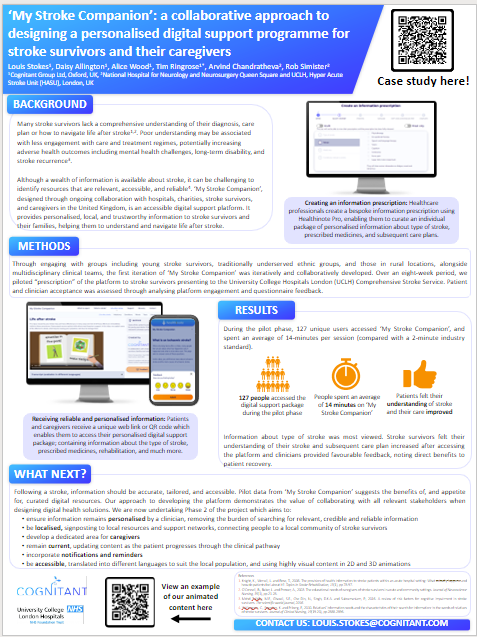This poster was presented at Med-tech World 2023. My Stroke Companion, co-created with UCLH, offers personalised advice and support for stroke survivors and their care givers as they navigate life after stroke.

Abstract
‘My Stroke Companion’: a collaborative approach to designing a personalised digital support programme for stroke survivors and their caregivers
Dr Louis Stokes1, Daisy Allington1, Dr Alice Wood1, Dr Arvind Chandratheva2, Dr Rob Simister2
1Cognitant Group Ltd, Oxford, UK, 2National Hospital for Neurology and Neurosurgery Queen Square and UCLH, Hyper Acute Stroke Unit (HASU), London, UK
Background and Objective
Many stroke survivors lack a comprehensive understanding of their diagnosis, care plan or how to navigate life after stroke. Poor understanding may be associated with less engagement with care and treatment regimes, potentially increasing adverse health outcomes including mental health challenges, long-term disability, and stroke recurrence.
Although a wealth of information is available about stroke, it can be challenging to identify resources that are relevant, accessible, and reliable. ‘My Stroke Companion’, designed through ongoing collaboration with hospitals, charities, stroke survivors, and caregivers in the United Kingdom, is an accessible digital support platform. It provides personalised, local, and trustworthy information to stroke survivors and their families, helping them to understand and navigate life after stroke.
Setting and Method
Through engaging with groups including young stroke survivors, traditionally underserved ethnic groups, and those in rural locations, alongside multidisciplinary clinical teams, the first iteration of ‘My Stroke Companion’ was iteratively and collaboratively developed. Over an eight-week period, we piloted “prescription” of the platform to stroke survivors presenting to the University College Hospitals London (UCLH) Comprehensive Stroke Service. Patient and clinician acceptance was assessed through analysing platform engagement and questionnaire feedback.
Results
During the pilot phase, 127 unique users accessed ‘My Stroke Companion’, and spent an average of 14-minutes per session (compared with a 2-minute industry standard). Information about type of stroke was most viewed. Stroke survivors felt their understanding of their stroke and subsequent care plan increased after accessing the platform and clinicians provided favourable feedback, noting direct benefits to patient recovery.
Conclusions
Following a stroke, information should be accurate, tailored, and accessible. Pilot data from ‘My Stroke Companion’ suggests the benefits of, and appetite for, curated digital resources. Our approach to developing the platform demonstrates the value of collaborating with all relevant stakeholders when designing digital health solutions.
Conflict of interest disclosure
The authors have no conflicts of interest to declare.
Cognitant
Looking to empower people with health information for better patient outcomes?
Related News
Kidney Research UK invests in Healthinote patient education platform which could support >15m people with long term health conditions
April, 2025
Oxford, January 2025 – Kidney Research UK, the leading charity dedicated to kidney health, has made a significant investment in Cognitant Group Ltd, a leading...
Webinar Insights – Compliance vs Patient Engagement: Can They Co-Exist?
April, 2025
Is compliance really a barrier to meaningful patient engagement in pharma, or are outdated myths holding us back? In this recent webinar, Dr Tim Ringrose,...
Funding awarded to innovations that support early diagnosis and rehabilitation of Stroke patients
March, 2025
SBRI Healthcare, an Accelerated Access Collaborative (AAC) initiative, in partnership with the Health Innovation Network, has awarded £2.5 million for the development of five innovations...